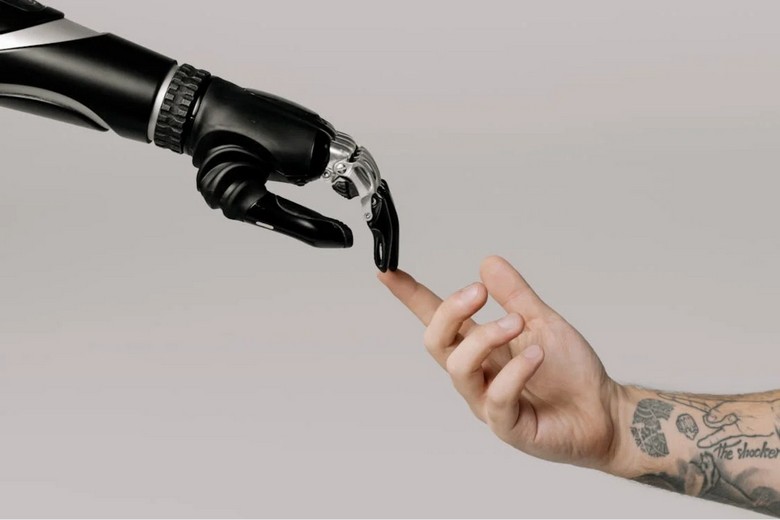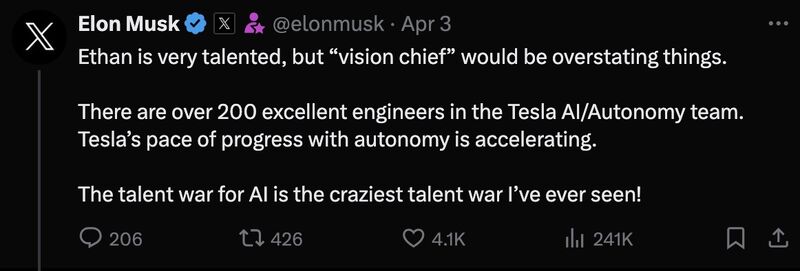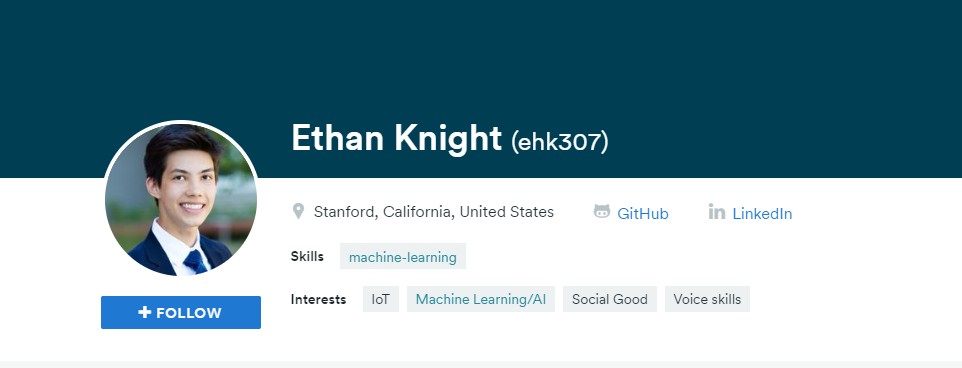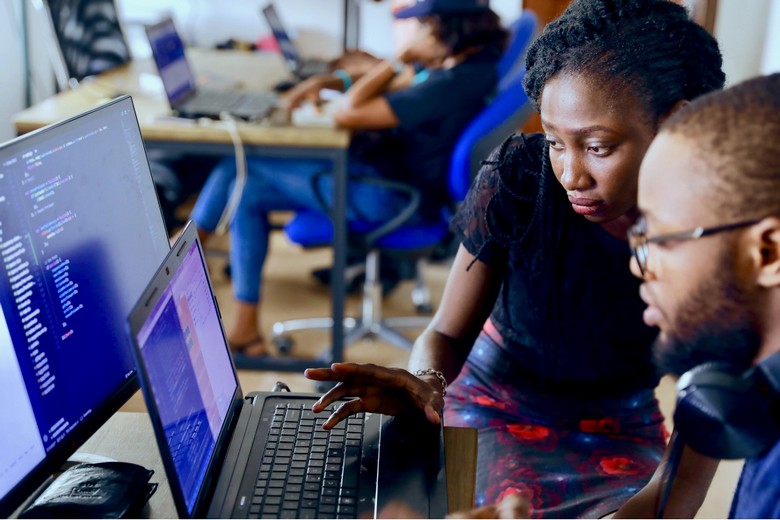



If there's anything harder to find than NVIDIA GPUs, it's AI talent. In early April 2024, Elon Musk took to X (formerly Twitter) to lament that the talent war in AI was "the craziest talent war" he'd ever seen.

Since the Silicon Valley giants opened this round of generative AI super arms race, in order to compete for top talent, Musk, Zuckerberg, and also Google founder Brin have personally come out, the hundreds of billions of dollars of the big boys, on the X (ex-Twitter) pay raises, send emails to poach, and personally call to keep people, one more than a hard, one more than a roll.
If it is still the AI research leaders that make the big boys personally fight, then slightly more senior AI engineers are also bidding on all sides of the salary surge. In Silicon Valley even began a legend, as long as the offer is well negotiated, AI talent million dollar annual salary is the industry standard.
Is this true? This article will talk to AI talents and senior HR of major companies in Silicon Valley, and try to take a look at the salary information of each AI company, to see if the million-dollar "AI workers" are really worth so much money, and whether the AI talent war is really so fierce.
Top AI talent that the big boys have personally snatched up
As China AI headhunter Henderson Executive mentioned at the beginning, Musk lamented that the AI talent war is the "craziest talent war" he's ever seen. What makes Musk lament this is that OpenAI has been trying to poach people with high salaries. This includes Tesla's former machine learning scientist Ethan Knight had planned to jump ship OpenAI, but was Musk hard to stay, pay raises and within the transfer to Musk's xAI company.
Ethan Knight isn't the only talent that OpenAI has tried to overpay. And in response to OpenAI's move to keep poaching people at huge salaries, Musk had to take to Twitter to publicly raise his salary, promising that he was going to increase the salaries of Tesla's AI engineering team.

According to a revelation by tech outlet The Information, OpenAI, in poaching senior researchers from Google, promised an annual salary (including stock) of between $5 million and $10 million.
OpenAI certainly isn't the only one digging around, and one of its biggest pursuers, Google, is just as relentless in its poaching. According to The Information, Google CEO Sundar Pichai Sundar Pichai personally poached three of Apple's top AI researchers. Even Apple CEO Tim Cook personally tried unsuccessfully to convince them to stay.
The Information broke the news that Sergey Brin personally called an employee who was considering leaving Google and joining OpenAI to persuade him to stay. It was Brin's call, along with other promises and additional compensation, that convinced the employee to stay on. And the story was even officially confirmed by Google.
Of course, personally pry the corner to dig people this kind of thing, do the most skillful still have to be Zuckerberg. In order to make Meta's open source model Llama can attract enough good people, Zuckerberg also personally wrote an email to Google DeepMind's artificial intelligence researchers, to invite them to join.
A person who wished to remain anonymous told The Information that in an email sent by Zuckerberg himself, he spoke about the importance of AI to Meta and expressed his desire for them to join Meta and work with him. And, with founder and CEO Zucker being so hands-on, Meta has been given the green light all the way from the company level... Interviews? That of course is not necessary, as long as these people are willing to come, the position is yours, the salary is even better to talk about, completely breaking Meta's own hierarchical range.
Moreover, Za is still very aware of the set of this group of top technical talent, it is not enough to give money, but also computing power, to be able to make results, is the most important thing for these top talents. So Zuckerberg announced in January that Meta has a large inventory of Nvidia H100 chips.The Verge reported that by the end of 2024, Meta will have more than 340,000 Nvidia H100 GPUs.And this has undoubtedly become an invaluable recruiting weapon in the war for AI talent, and one of the great attractions of Meta.

And according to Business Insider, OpenAI CEO Sam Altman makes personal calls to snag people. And the trick does work: the report then shows that a number of talents who passed OpenAI's interviews but were still on the fence, quickly accepted offers after receiving a call from Sam Altman.
Some people may ask, companies poach each other like this, talent jumps around like this, don't companies have non-compete agreements? In Silicon Valley, it really doesn't.
To encourage the free movement of talent, the California region, where Silicon Valley is located, legislated against non-compete agreements in 1872, and in 2023 went even further in restricting non-competes: by February 14, 2024, employers will be required to provide personalized, written notices to both current and departed employees stating that any non-compete clauses after separation are null and void, or face penalties.
The practice has also been extended throughout the U.S. And just a while ago, the Federal Trade Commission FTC announced a U.S.-wide ban on new non-compete agreements for all employees, including senior executives.
Such a loose legal framework has led to a very large flow of talent among big companies such as Google, OpenAI, and Meta in this AIGC wave. According to statistics firm Live Data Technologies, members from Google and DeepMind teams account for 7.5% of the total inflow in OpenAI, much higher than Stripe in second place and Meta in third place, while according to a report by The information, between December 2022 and February 2023 , OpenAI has hired more than 12 Google AI-related employees, with at least five former Google researchers playing significant roles on ChatGPT.
So, in such a fierce AI talent grabbing war, it is up to the big man himself to come down and draw cakes for everyone there is no. In the final analysis, to attract good talent, abundant funds are a prerequisite, otherwise it may not be useful to draw cakes again. This actually makes the big companies in this round of AI talent war is to eat all the dividends, for example, really can not dig over the people, I directly take the startups to the acquisition of a pot of money, this is not a way?
So let's get back to the higher segment of Silicon Valley giants' poaching strategy: acquisitions.
High-level poaching: "hollowing out" startups
As you may recall, at the end of 2023, when OpenAI's board of directors infighting, Sam Altman was once fired, when Microsoft immediately offered Sam the position of head of internal AI, and after that it was most of the employees who expressed their loyalty to Sam and were willing to follow Sam to join Microsoft.
At that time, Microsoft almost had the entire OpenAI team in its pocket without much effort. Although this was later reversed and Sam Altman returned to OpenAI, it seems that Microsoft was inspired by this incident, and then started a higher level of "talent in one pot" play.
In April 2024, Microsoft announced the formation of Microsoft AI, integrating Microsoft's consumer AI efforts as well as products like Copilot, Bing, Edge, and more. And in a big surprise, Mustafa Surleyman, co-founder of the stellar AI modeling startup Inflection AI, will serve as CEO of this new entity, reporting directly to Microsoft CEO Nadella.
And Karen Simonyan, Inflection AI's other co-founder, serves as Microsoft AI's chief scientist. There are also most of the 70 Inflection AI employees that follow the two co-founders.
Seeing this, everyone is confused: what is the meaning of this? You know, just nine months before Microsoft's announcement, Inflection AI just completed a round of financing of 1.3 billion dollars, valued at more than 4 billion dollars. What does it mean that the two founders ran away with their employees so quickly?
Let's paraphrase: Microsoft paid Inflection AI $650 million to enter into an agreement, of which $620 million was to get the license and use of Inflection's AI models, while the remaining $30 million was to give Microsoft the legal right to mass hire at Inflection.
One thing to note is that this agreement is not an acquisition! While Microsoft was previously a major investor in Inflection AI, this $650 million deal involves no new shareholding, no technology transfer, and is primarily about poaching.
The two co-founders of Inflection AI are the kind of top talent that any tech giant would be begging for these days: one of them, Mustafa Suleyman, is an AI meta-god and co-founder of the AI lab DeepMind, and the other founder, Karén Simonyan, is also a former DeepMind principal researcher, not to mention the not to mention the close to 70 members that follow them.

Microsoft's move, undoubtedly means that only cost 650 million dollars, in disguise, "empty" Inflection AI, can be said to be a disguised acquisition, but also to avoid the acquisition of potential "antitrust" review. I can only say that Nadella is really a master.
In the wake of this big move, Inflection AI has one co-founder left, and Silicon Valley tech bigwig Reid Hoffman, brought in a new CEO, Sean White, to try and save the company.
While there are reports that Inflecction AI intends to use some of the $650 million to buy back investors' shares at 1.5:1 to ensure that they don't lose money, there is no doubt that the future of Inflection AI, which has lost so much top talent, is in question.
China AI recruitment agency believes that Microsoft's big move can make us feel the tech giant's determination to grab talent, but it also makes people have a cold sweat about whether startups can retain talent.
Startups have a hard time grabbing people
As Guangzhou headhunter said earlier, big companies get down to business so fast and hard, but startups have a harder time. Startups are about attracting the best talent to launch the hardest things the fastest, but the very essence of AI startups is doomed, it's a war of capital: how can startups attract good talent?
Even Aravind Srinivas, CEO of well-known AI startup Perplexity, has been spilling his guts to the media. He said that due to limited funding and a shortage of chips, Perplexity is having trouble finding the talent needed to create large-scale language models.
Aravind names Musk's xAI directly, saying that xAI has become one of the highest paying companies for AI talent, on par with OpenAI, including xAI telling new hires that their stock options are tied to the company's valuation, in which case xAI can keep up with whatever offer Perplexity makes, and in the eyes of others, even if it's the same offer, the xAI's are more attractive because that carries Musk's aura after all.
And it's not just about money, as we've said before, the GPU computing power that big companies have has become the most favorable weapon to attract top AI talent. After all, in the case of all over the world is not bad money, can get resources faster to make results, in today's AI war, for these top talents is the most important thing.
Aravind Srinivas (CEO of AI startup Perplexity): "I tried to hire a very senior researcher from Meta and you know what they said? "Come back to me when you have 10,000 H100 GPUs", getting 10,000 H100s in 5-10 years that's billions of dollars to spend, where am I going to conjure up that many chips out of thin air? "

Aravind also said that it is difficult to get AI talent to leave their current company to join a Start up. Because the previous company already has good experimental experience and existing models to start up with, startups must offer very attractive incentives and immediately available computing resources.
And even if smaller companies like Perplexity had access to Nvidia's chips, they would continue to fall behind because AI is moving so fast. In this race for speed, it will always be difficult for tech giants to catch up.
Aravind Srinivas (CEO, AI startup Perplexity): "Even if by the time you have enough money and chips, the big models will be iterating again, and they'll be like, 'Look, the world has changed,' I'll come back after the next version of the model is trained. I'll come back after the next version of the model has been trained. This time, come back to me when you have 20,000 H100s. "
Above we're actually talking mostly about top talent in generative AI. Although there are not a lot of AI and machine learning talents in the talent market, generative AI big models is a track that has only been popular in the last few years, and the Transformer paper was just published in 2017, so there aren't many top AI talents who really understand and can lead the technology forward in this specific AI track of neural networks.
Naveen Rao, head of generative AI at Databricks, talked about candidates who have trained large language models from scratch or who can help solve challenging dilemmas in AI training, such as the phenomenon of hallucinations, and Naveen said there are probably only a few hundred qualified people on the market.
You might be thinking that startups go for these hundreds with the tech giants, how can they possibly do that right?
But if your startup is so sought-after that employees feel like you're a great hope for a run, it doesn't necessarily mean you can't recruit the best people. After all, in Silicon Valley, a lot of bulls want to go entrepreneurial or join early stage startups precisely because the bulk of the payoff isn't in the base salary, but in the doubling of equity.
Keith Zhai, co-founder of Silicon Valley-based AI agent startup TinyFish, told us that they then managed to poach E7-level talent from Meta. And they were the ones who gave up millions of dollars a year from the big players and chose to join their startup.
I understand that it should be more than a million dollars, probably about two million dollars. Simply from the salary what these words, in fact, is not comparable, can only say that it is not an order of magnitude, is to do any one startup (startup) it is not possible to come up to say that I give you to open a 2 million, then this case this company do not have to do.
Keith's experience from hundreds of rounds of interviews is that there are two things that are important to be able to snatch top talent from big companies, one is that the Mission and Vision of the startup should be attractive enough, that is to say, what the startup is trying to do and whether it can solve interesting and meaningful problems in the society or in the business; and the other is that the company's culture should be recognized by these talents. The other is that the company's culture should be recognized by these talents.

Keith Zhai (Co-Founder, TinyFish)
Because this money then incentivize what these things, under this stage, may be very often is very poor, is that you can not say is that you can match (match) a big factory salary. Especially now that the stock market has been doing so well lately, there is no possibility for you to match these things. What should we do then? People say you get options and all this, this is all very false things. That is, if people do not have the first two, he does not believe that he this option you give how much in fact there is no sense, is to abolish a piece of paper. This scrap of paper are not counted, because you also have no paper.
In Silicon Valley, entrepreneurship is seen as a game for the brave, and it is certainly risky. The failure rate is over 90% from starting a company to the final successful exit, including being acquired or going public with an IPO. But here, there are still very many people joining the wave of entrepreneurship. It's no surprise in this wave of AI.
Equity Multiples and the Lure of Wealth Freedom
This round of AI startups in Silicon Valley has been dominated by a fast pace, with quick model and product updates, quick funding, and quick valuation rises. This has left some star startups not without a chance to compete with the giants for top talent.
For example, there is a small partner, he is in an early round, joined a particularly fast-growing AI startup, in a year's time, his package (total salary package) 10 times, in my opinion, immediately can be wealth free.
And a big part of the value of startup star companies, including OpenAI, Anthropic and xAI, is actually the value of options, which are actually much more attractive for AI talent.
OpenAI, which is known for giving out high salaries, has reached a median annual total salary of $906,000 at the L5 Senior Engineer level, that is, including base salary and OpenAI's unique PPUs, combined.
Here's an explanation of OpenAI's PPU, the full name is Profit Participation Units, because OpenAI's parent company is a non-profit organization sheathed in the unique structure of a for-profit entity and capped at a 10x return for investors and shareholders.

So OpenAI's PPU, a unique equity-like incentive, allows employees to share in the company's future profitability but is also subject to a 10x return cap.
This means that the talent coming to OpenAI has two options for converting PPUs into cash. The first option is to hold the PPUs for a long time until OpenAI makes a sizable profit to make a 10x cash out, but according to OpenAI's current demand and spending of funds, when they will make a profit is a huge unknown. The second, more direct option is to sell them early to other VC funds and investors, at a price that depends on the market price at the time. In addition, OpenAI's PPUs have a two-year lock-in period, meaning that new hires must hold them for two years before they can be sold. However, in order to appease and incentivize employees, OpenAI has also conducted buybacks so that employees can sell their PPUs for cash.
And PPUs are a sizable percentage inside the total compensation package. According to levels.fyi, we just said that the average OpenAI L5 Senior Engineer salary is $900,000, with most of them earning $300,000 per year in base salary, while PPUs make up 2/3 of the total compensation, worth almost $604,000 . This means that PPU could end up paying employees up to 10x their cash compensation, or $6.25 million. Doesn't that sound particularly rosy?
However, we have to pour cold water on everyone from our side, and all these millions of annual salaries and robberies we mentioned above refer to the top AI talents.
Even L5 senior engineers at the same level at OpenAI, working in AI and machine learning, are significantly higher than the rest. Meanwhile, full-stack software engineers at the next level down, L4, get $245,000 in base pay but half that in PPUs at $304,000, with total pay in the $500,000+ range.
So, as you can see, even after joining OpenAI, the gap in salary brackets between different levels and types of jobs is still quite large.
And join the other more early AI startups 10 times a year valuation, but also just an example, and are still paper value (paper value), can realize are still huge unknowns, after all, like inflection AI, stability AI and so on so starry startups say scattered can be scattered. So, let's throw some cool water on the table.
"Per capita million annual salary" rumor: AI talent salary grading
In the whole process of pre-training-fine-tuning-post-training of generative AI big models, there is the greatest need and the highest demand for talent that can be involved in pre-training, and when it comes to the application layer, it can be done by non-AI engineers as well.
Shenzhen AI headhunter spoke with an engineer in the field of large language modeling currently at a well-known company in Silicon Valley, who asked to remain anonymous to participate in the conversation, and also told us that in the field of large language modeling, there is a different talent needed at each stage, and that there is a very wide gap in salary packages depending on skills and experience.
Anonymous interviewee (Big Language Modeling Engineer) told Shenzhen AI headhunter: "In terms of going from pre-train models to later applications, it is the pre-train that requires the highest talent density, because the threshold for fine-tuning is not really that high. The threshold for fine-tuning isn't really that high. Then if you only directly call the API to do application (application), is now a lot of YC startup is to do so, and then should only need engineers can be, is the normal back ends front end engineer (back end / front end engineer) can be. "
AI talent is more interested in those star companies, such as OpenAI, Anthropic, is our video before the said, can give a high amount of treatment, so-called "monster package" (huge compensation package) million annual salary companies, they want to talent is also very high threshold. They also have a very high threshold for the talent they want.
Anonymous interviewee (Big Language Modeling Engineer) told Guagnzhou AI recruitment agency: "If you're a PhD in a related field, and then you've published papers, and you've got some name recognition in academia, and you know a lot about doing pre-training, including post-training, these algorithms and so forth, you're going to be very much up for grabs. "

Some particularly powerful scientists (科学家), it is a few million dollars in salary, high salary to join some companies, that is, to reach the million (百万) level of annual salary, not a million level, but a few million level of annual salary.
The reality is that, if it is not particularly top AI scientists, in fact, millions of high salaries and ordinary AI workers have little to do. Dr. Tom Zhang, a veteran Silicon Valley talent expert who has worked in human resources at Tesla and Google, told us that "millions per capita" is more of a "rumor".
If a student, doesn't have the aura of the Trojans as such, these high offers have little to do with them. So this boom right now is a superficial boom, there aren't that many positions, and it's hard to apply. If you're doing AI, you'll probably have an advantage if you have 3 years of experience equivalent to someone else's 5 years, or if you have 5 years equivalent to someone else's 10 years, and this kind of exceptionally high offer only occurs in a small number of cases, and it's not the norm.
In general, the base salary of AI engineers will be higher than ordinary engineers, attracting talent mainly by stock incentives, and in large companies, because each level has its own Band, that is, "salary guidance range", so the same level of AI engineers will be higher than the software engineers, but not too much higher.
Another of our sources also revealed that AI positions in the company and the company to talk about the salary, the company can really give to a specific Band (level) of the highest salary, a little more cash or a little more stock, or even a little bit more than the Band (level) range is also able to fight for, but too much, you need to vice president of the VP level of executives approved, so the general AI engineers can not really get that kind of treatment.
Some big companies, these are very standardized, not too much difference. For example, this 280,000, this person is very good, then after special authorization to give a 300,000 may also be possible, but you say to give a 500,000, this is a little bit outrageous, will not appear this situation.
And aside from the few tech giants we mentioned earlier and star startups like OpenAI, many other tech companies that aren't head players on the AI track are far less generous with what they give to AI-related talent.
For example, a very large number of company job postings show base salaries under $300,000 and give limited stock or equity.
If OpenAI gives a base salary to PPU (or equity incentive) ratio of 1:2, the average company doesn't even come close to 1:1.

Usually there is no 1:1, many companies are 1:0.25, i.e. the average other company might be $310,000 BASE, plus one $100,000 per year for this stock.
For example, LinkedIn Senior AI Engineer Senior AI Engineer position, the base salary is between $128,000 ~ $210,000, and Levels.fyi data above also shows that this level of stock incentives, indeed less than 1:1. In addition, Amazon and other companies are also very close to the situation.
Therefore, the conclusion is that there are indeed cases of astronomical salaries, and mid-level AI talent is also popular, but far less exaggerated than the industry "rumor" of millions of dollars per capita. But such industry rumors do make a lot of international companies to Silicon Valley to poach people, there is some confusion, international companies do not know how to determine what is the top AI talent, but also appeared to recognize only the label of the situation.
What makes an AI Senior? Who defines that? Because at present, everyone is confused, they do not quite understand, so they all take the label on you, that is, there is OpenAI, Google's label, there is the Turing Award, the students of the three giants, the students of Mr. Fei Fei Li and Mr. Wu Enda as talents, if there is no such a label, it is not a talent? It would be unrecognizable now. Even if you are a graduate of an Ivy League school, although what you learn is also AI, people may not necessarily treat you as an AI senior talent.
This is where the labeling of talent currently occurs.
And it's not enough for international companies to come to Silicon Valley to poach people and offer attractive salaries. Even though there are currently Asian companies that are directly offering one million dollar cash compensation packages, note, all cash million compensation packages that directly liquidate equity, even then it's hard to poach talent.
Anonymous interviewee (Big Language Modeling Engineer): "He's probably going to go out and offer a million-dollar package to poach anyone from OpenAI. But people don't go there, after all, you go there and there's nobody there, you might have to build this thing, you might want to work with people who know more about it, and it's very hard to do it solo. "
In any case, it is important to "make it". Whether it is for the technology company that snatched people, or the AI talent that was snatched, if the generative AI technology and industry can not be done, can not be pushed down, then all these valuation data, are illusory bubbles.
AI's FOMO mood, it's just getting started
Silicon Valley in the middle of 2024 is facing two very different trends: a wave of layoffs that isn't ending for tech companies, but a shortage and scramble for AI talent. It's called FOMO, fear of missing out. And the FOMO sentiment goes both ways.
China recruitment agency says for the labor market, a large number of engineers who had previously "switched codes" are worried that AI will soon begin to take away their jobs, while at the same time envious of the valuation of AI startups that have doubled several times a year.
It's not just Silicon Valley tech giants for tech companies, even traditional companies are getting in on the action to hoard talent. From Walmart to Procter & Gamble to Accenture, it's all about attracting the best and brightest AI talent to join their companies.The number of generative AI-related job postings on the job site Indeed quadrupled in the first eight months of 2023, and of course, as we've emphasized, there is a huge pay gap depending on the seniority of the company and the position.
While it seems like the amount of money and resources that major companies have been dropping has been smashing, there's no doubt that the AI boom is still going on.

At a critical time when Musk is cutting back on investment in new car production capacity, Tesla has spent $10 billion this year alone to bolster AI training and reasoning. Musk even posted, "Any company that doesn't spend at this level and isn't efficient can't compete."
And after Meta's stunning earnings report, Zuckerberg announced the continuation of All in AI. meta's full-year capital expenditures were revised upward from $30 billion to $37 billion to $35 billion to $40 billion to build out data centers to support the AI business.
Google expects to spend more than $12 billion in capital expenditures every quarter in 2024, with at least 49% year-over-year growth for the full year, in order to maintain its leadership in AI infrastructure, while Microsoft has decided to scale up its AI investments, with $14 billion in capital expenditures in the current quarter, and expects to see a significant increase in capital expenditures in the next quarter on a year-over-year basis.
Under such an offensive, the battle for AI will continue. And for the top AI talents, perhaps salary is no longer what they are most interested in, what kind of things they can accomplish is what they are most concerned about. Like Andrej Karpathy, a founding member of OpenAI, who jumped from OpenAI to Tesla, then jumped from Tesla back to OpenAI, and recently left OpenAI to go out on his own.
Another example is Ilya Sutskever, OpenAI's technical soul, who eventually resigned after a conflict on OpenAI's board of directors because his philosophy didn't sit well with CEO Sam Altman, and he was followed by a number of OpenAI's talents.



